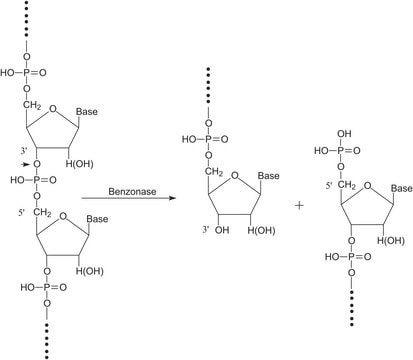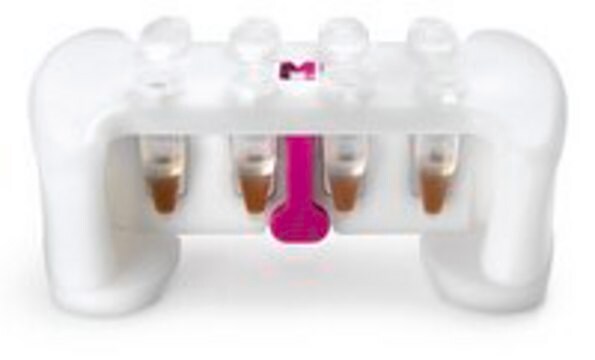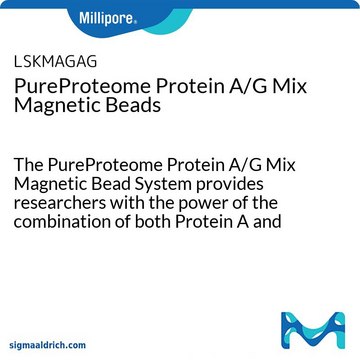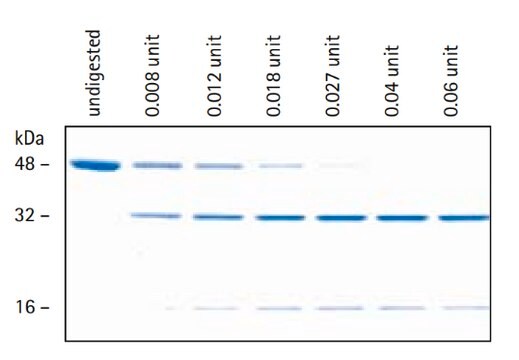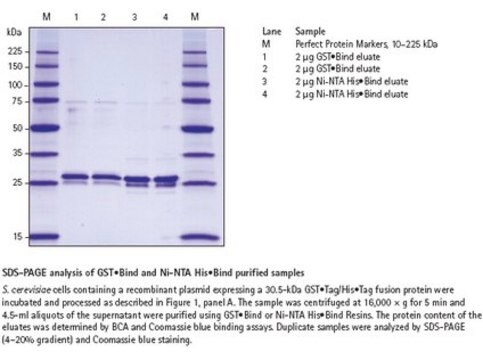11719394001
Roche
Immunoprecipitation Kit (Protein A)
sufficient for 20 reactions, kit of 1, suitable for immunoprecipitation (IP)
About This Item
Productos recomendados
usage
sufficient for 20 reactions
packaging
kit of 1
manufacturer/tradename
Roche
technique(s)
immunoprecipitation (IP): suitable
storage temp.
2-8°C
General description
Application
Packaging
Preparation Note
The kit contains reagents for 125 ml of lysis buffer/wash buffer 1. Prepare at least a minimal volume of 25 ml, sufficient for four immunoprecipitations.
To prepare 25 ml of lysis buffer/wash buffer 1 mix 5 ml core buffer, 3.75 ml NaCl, 2.5 ml detergent mix and 1 cOmplete tablet. Add water to a final volume of 25 ml.
Solution is stable at 2 to 8 °C for 24 hours. When stored in aliquots at -15 to -25 °C, the solution is stable for at least four weeks. Mix thoroughly after thawing.
Wash buffer 2
The kit contains reagents for 50 ml of wash buffer 2. 2 ml of this buffer is required for one immunoprecipitation.
To prepare 50 ml of wash buffer 2 mix 10 ml core buffer, 25 ml NaCl and 0.5 ml detergent mix. Add water to a final volume of 50 ml.
Solution is stable at 2 to 8 °C. For longer periods, store aliquots at -15 to -25 °C. Mix thoroughly after thawing.
Wash buffer 3
The kit contains reagents for 25 ml of wash buffer 3. 1 ml of this buffer is required for one immunoprecipitation.
To prepare 25 ml mix 1 ml core buffer and 0.25 ml detergent mix. Add water to a final volume of 25 ml.
Solution is stable at 2 to 8 °C. For longer periods, store aliquots at -15 to -25 °C. Mix thoroughly after thawing.
Other Notes
Solo componentes del kit
- Core Buffer
- NaCl
- Detergent Mix
- cOmplete Protease Inhibitor Cocktail Tablets (5)
- Protein A Agarose ready-to-use
signalword
Danger
hcodes
Hazard Classifications
Aquatic Chronic 2 - Eye Dam. 1 - Skin Corr. 1B - Skin Sens. 1
Storage Class
8B - Non-combustible corrosive hazardous materials
wgk_germany
WGK 3
flash_point_f
does not flash
flash_point_c
does not flash
Certificados de análisis (COA)
Busque Certificados de análisis (COA) introduciendo el número de lote del producto. Los números de lote se encuentran en la etiqueta del producto después de las palabras «Lot» o «Batch»
¿Ya tiene este producto?
Encuentre la documentación para los productos que ha comprado recientemente en la Biblioteca de documentos.
Los clientes también vieron
Protocolos
Immunoprecipitation Kit (Protein A) Protocol & Troubleshooting
Nuestro equipo de científicos tiene experiencia en todas las áreas de investigación: Ciencias de la vida, Ciencia de los materiales, Síntesis química, Cromatografía, Analítica y muchas otras.
Póngase en contacto con el Servicio técnico


